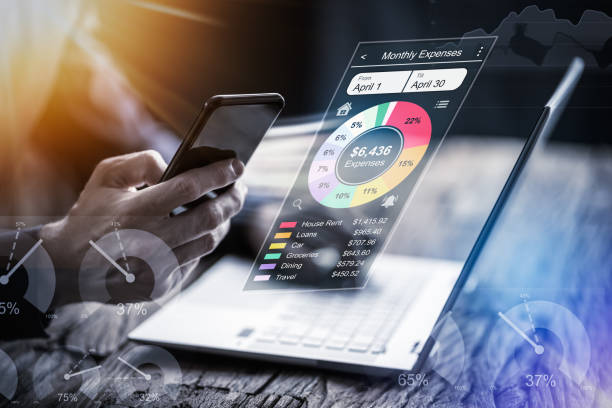In today’s fast-paced world, managing your personal finances effectively is crucial to achieving financial stability and reaching your financial goals. Fortunately, there’s a powerful tool at your disposal – the personal finance tracker. In this comprehensive guide, we will delve into the world of personal finance trackers, explaining what they are, how they work, and why you should consider using one.
What Is a Personal Finance Tracker?
A personal finance tracker is a digital tool or application designed to help individuals manage their finances, track expenses, set budgets, and monitor financial goals. It serves as your finances and savings money, providing valuable insights into your income, expenses, and overall financial health.
Why You Need a Personal Finance Tracker
1. Gain Financial Awareness
A personal finance tracker allows you to have a clear overview of your financial situation. It consolidates all your financial data in one place, making it easier to understand your spending patterns.
2. Budgeting Made Easy
With a finance tracker, creating and sticking to a budget becomes effortless. You can set spending limits for various categories and receive alerts when you’re approaching your limits.
3. Track Your Expenses
Tracking every expense manually can be time-consuming and error-prone. A finance tracker automates this process, categorizing your expenses and providing detailed reports.
4. Goal Achievement
Whether you’re saving for a vacation, a down payment on a house, or retirement, a personal finance tracker helps you set and track your financial goals.
Types of Personal Finance Trackers
There are various types of personal finance trackers available, catering to different needs and preferences. Here are some of the most common ones:
Mobile Apps
Mobile apps are user-friendly and convenient. They often come with features like expense tracking, budgeting, and goal setting.
Web-Based Trackers
Web-based trackers offer the advantage of accessibility from any device with internet access. They sync with your bank accounts and credit cards for real-time data.
Spreadsheet Templates
For those who prefer a hands-on approach, spreadsheet templates like Excel or Google Sheets can be customized to create your personal finance tracker.
Specialized Software
Some software programs are specifically designed for personal finance tracking, providing advanced features and in-depth financial analysis.
Choosing the Right Personal Finance Tracker
Selecting the right personal finance tracker depends on your unique financial needs and preferences. Consider factors such as ease of use, compatibility with your devices, and the features it offers.
Getting Started with Your Personal Finance Tracker
Once you’ve chosen the right finance tracker for you, it’s time to get started. Follow these steps:
Step 1: Input Your Financial Data
Start by entering your financial data, including income sources, expenses, debts, and assets.
Step 2: Set Financial Goals
Define your short-term and long-term financial goals, such as paying off debt, saving for retirement, or buying a home.
Step 3: Create a Budget
Use the tracker to create a realistic budget that aligns with your financial goals and lifestyle.
Step 4: Monitor and Adjust
Regularly review your tracker to monitor your progress and make necessary adjustments to your budget and goals.
Benefits of Using a Personal Finance Tracker
The advantages of using a personal finance tracker are numerous:
- Improved financial awareness
- Efficient budget management
- Better control over spending
- Increased savings and investments
- Goal achievement
More Benefits of Using a Personal Finance Tracker
Debt Management
If you have loans or credit card debt, a personal finance tracker can help you create a strategy for paying it off efficiently. By visualizing your debt and interest rates, you can prioritize which debts to tackle first.
Expense Tracking
Detailed expense tracking can reveal areas where you might be overspending. It allows you to identify unnecessary expenses and make adjustments to your budget accordingly.
Financial Goal Visualization
Seeing your financial goals within the tracker can be incredibly motivating. As you watch your progress over time, you’ll feel more encouraged to stick to your budget and save for the future.
Tax Preparation
During tax season, having all your financial data neatly organized in your expert can make the process of preparing and filing your taxes much smoother. You can easily access income and expense reports for accurate tax calculations.
Financial Peace of Mind
Knowing that your financial information is up-to-date and accessible at any time can provide a sense of security and peace of mind. You’ll be better prepared for unexpected expenses or emergencies.
Tips for Maximizing Your Personal Finance Tracker
Consistent Data Entry
To get the most accurate insights, make sure to consistently input your financial transactions into the tracker. Schedule a regular time each week to update your data.
Review and Reflect
Take some time each month to review your financial reports and reflect on your spending habits. Are there areas where you can cut back? Are you making progress towards your goals?
Automate Whenever Possible
Many finance trackers can automatically sync with your bank and credit card accounts, saving you time on manual data entry. Take advantage of these features to keep your data current.
Set Realistic Goals
While it’s important to aim high with your financial goals, make sure they are also realistic. Setting achievable milestones will keep you motivated and prevent frustration.
Seek Professional Advice
If you have complex financial situations or investment goals, consider consulting a financial advisor. They can provide expert guidance and help you integrate your tracker into a comprehensive financial plan.
In Conclusion
A personal finance tracker is more than just a tool; it’s a companion on your journey to financial well-being. By leveraging its benefits and following best practices, you can take control of your finances, reduce stress, and work towards a brighter financial future.
Remember that financial success is a process that requires dedication and continuous learning. You’re well-equipped to navigate the intricacies of personal finance and achieve your financial dreams.

